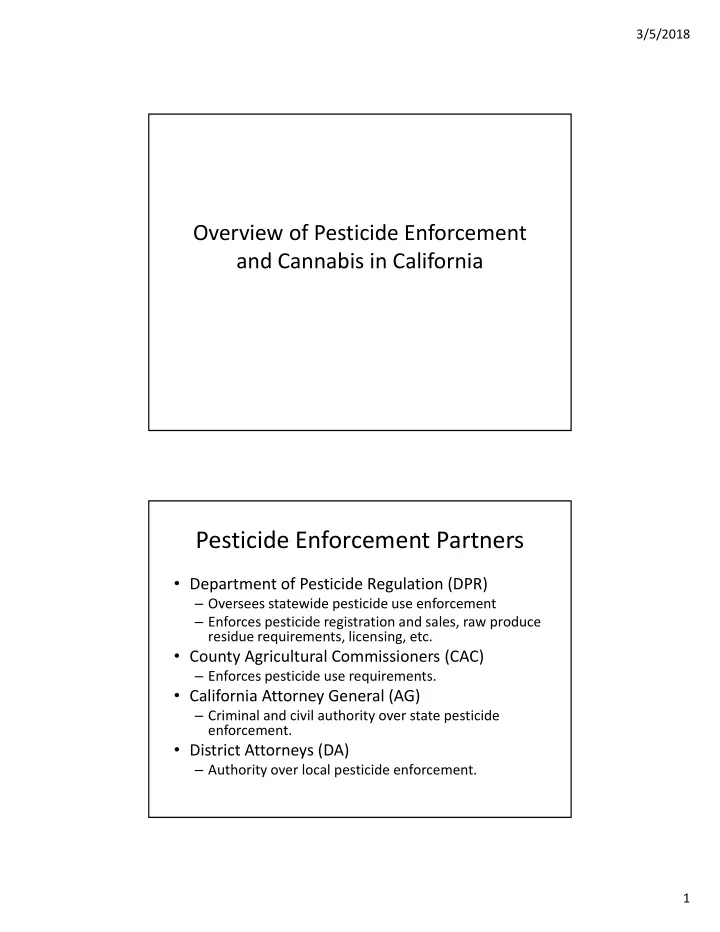

3/5/2018 Overview of Pesticide Enforcement and Cannabis in California Pesticide Enforcement Partners • Department of Pesticide Regulation (DPR) – Oversees statewide pesticide use enforcement – Enforces pesticide registration and sales, raw produce residue requirements, licensing, etc. • County Agricultural Commissioners (CAC) – Enforces pesticide use requirements. • California Attorney General (AG) – Criminal and civil authority over state pesticide enforcement. • District Attorneys (DA) – Authority over local pesticide enforcement. 1
3/5/2018 County Agricultural Commissioners • Each California county has a CAC. • Primary local enforcement agents for pesticide use requirements. • Do not have peace officer status. Role of the CAC’s • Investigates complaints and reported pesticide ‐ related illnesses • Inspects agricultural fields • Issues restricted material permits and operator identification numbers • Provides compliance assistance, enforces pesticide use violations through administrative civil penalty actions, or refers cases to the DA. 2
3/5/2018 Administrative Penalties • FAC section 12999.5 • CAC has exclusive jurisdiction • Up to $5,000 administrative civil penalty per violation Civil Penalties • FAC section 12997 • In lieu of administrative civil penalty, DPR may refer cases to the California AG • Civil penalty of $1,000 to $10,000 • Repeat violations ‐ or ‐ intentional violations involving human health or environmental hazard subject to civil penalty of $5,000 to $25,000 3
3/5/2018 Criminal Penalties • FAC section 12996 • Misdemeanor violations – $500 to $5,000 criminal penalty, and/or – Imprisonment of not more than six (6) months • Repeat violations – $1,000 to $10,000 criminal penalty, and/or – Imprisonment of not more than six (6) months • Intentional ‐ or ‐ negligent violations involving health or environmental hazards – $5,000 to $50,000 criminal penalty, and/or – Imprisonment in county jail/state prison of not more than one (1) year Pesticide Requirements under MAUCRSA (SB 94) • DPR: – Guidance on legal pest management to growers. – Guidance on pesticide residue levels to the Bureau of Cannabis Control (BCC). • Department of Food and Agriculture (CDFA): – Licenses and regulates cannabis cultivators. – Compliance with pesticide laws as enforced by DPR is a condition of CDFA cannabis cultivation licenses. • BCC: – Licenses and regulates cannabis testing laboratories. – BCC sets allowable levels for pesticide residue (and other contaminants) on processed cannabis/cannabis products after considering the DPR guidance. 4
3/5/2018 Role of the CAC’s – Legal (Licensed) Cannabis • To inspect and investigate licensed cannabis cultivation operations to determine compliance with California pesticide use requirements. • Provide compliance assistance and take enforcement actions where appropriate. Role of the CAC’s – Illegal (Unlicensed) Cannabis • CAC’s do not generally enter, inspect, or enforce against illegal cannabis grow sites because they do not enforce criminal violations and do not have peace officer status. • DPR is available and encourages CAC’s to be available to assist law enforcement in case ‐ building activities such as identifying, handling, and sampling pesticides found at illegal grows. 5
3/5/2018 California Pesticide Laws • California Food and Agricultural Code (FAC), Divisions 6 and 7 • California Code of Regulations (CCR), Title 3 Examples of Pesticide Use Violations • FAC section 12973 – Use in conflict with the label. • FAC section 12995 – Possession or use of an unregistered pesticide. • FAC sections 14011; 14015 – Unlawful use or possession of restricted materials. • FAC section 12991(e) – Unlawful pesticide use, transport, storage, handling, or disposal. 6
3/5/2018 Examples of Pesticide Use Violations • FAC section 12972; 3 CCR 6614 – Pesticide drift. • 3 CCR 6670, et seq. – Storage, transportation, and disposal of pesticides. • 3 CCR 6609; 3 CCR 6800, et seq. – Restrictions on pesticide use near wellheads and groundwater contamination prevention. Pesticide use enforcement and Cannabis • Under California law, pesticides must be used consistent with the registered labeling. • All pesticides are first registered with the federal EPA. Because cannabis is illegal federally, there are no pesticides registered for use on “cannabis.” • Even under these facts, there are still some pesticides that are legal to use on cannabis under state law. 7
3/5/2018 Pesticides that are Legal to Use on Cannabis under State Law 1) Exempt from tolerance requirements AND 2) Exempt from registration, or registered for a use site that is broad enough to include cannabis DPR has released a document discussing legal pest management practices. Pesticides that cannot be Used on Cannabis • DPR has released a document listing pesticides that DPR has instructed the CAC’s to prioritize enforcement against: ‐ Labeled with a “DANGER” signal word; ‐ Restricted Materials; ‐ Not registered for food uses; ‐ Groundwater protection list. 8
3/5/2018 Contact • Daniel Rubin, DPR Staff Attorney Daniel.Rubin@cdpr.ca.gov (916) 324 ‐ 2666 • Rachel Kubiak, DPR Cannabis Program Supervisor Rachel.Kubiak@cdpr.ca.gov (916) 445 ‐ 5010 • County Agricultural Commissioners https://www.cdfa.ca.gov/exec/county/countymap/ 9
Recommend
More recommend